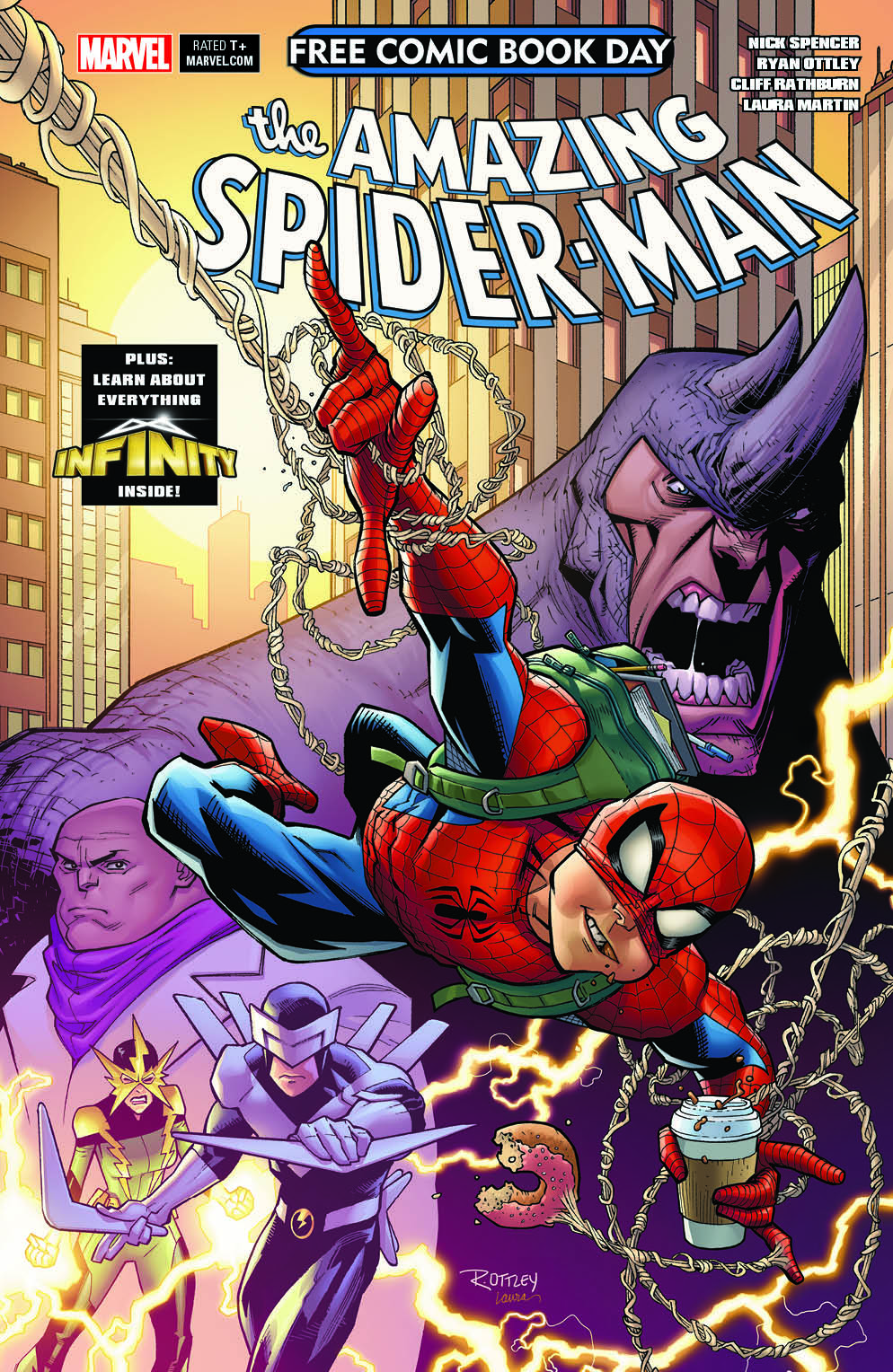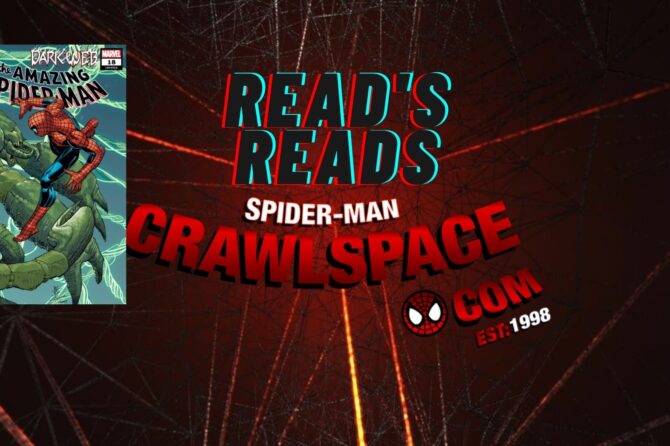 I’ll make this brief. Or at least try to. There’s a new Game of Thrones on and I must give it my utmost attention. That show and this comic have… some stuff in common, maybe? Uh, there’s a conflict between an inexperienced teenager bestowed with power and his uncle. Granted, the uncle in Game of Thrones is an amazingly awesome dwarf with a strong pimp hand. Here, it’s just a conman/thief trying to manipulate his nephew for personal gain. It’s not a perfect comparison.
I’ll make this brief. Or at least try to. There’s a new Game of Thrones on and I must give it my utmost attention. That show and this comic have… some stuff in common, maybe? Uh, there’s a conflict between an inexperienced teenager bestowed with power and his uncle. Granted, the uncle in Game of Thrones is an amazingly awesome dwarf with a strong pimp hand. Here, it’s just a conman/thief trying to manipulate his nephew for personal gain. It’s not a perfect comparison.
Ultimate Comics: Spider-Man #10
Writer: Brian Michael Bendis
Art: David Marquez
Colors: Justin Ponsor
Lettering: VC’s Cory Petit
Cover: Kaare Andrews
Plot: Spider-Man and the Prowler meet on a rooftop in Brooklyn. The Prowler addresses the hero by his real name, but Miles refuses to remove his mask when asked. Uncle Aaron reveals himself to his nephew, tells him the Spider-Man mask doesn’t belong to him, and explains how the spider came to bite Miles. Aaron catches the new Spider-Man by surprise when he attacks him in order to test his potential. Aaron uses a laser attack to throw Miles off his guard and unmasks him. Now exposed, Miles goes on the offensive.
 Miles lunges at his uncle and throws kicks and punches. All the while Aaron goads him to try harder. Miles finishes the skirmish by using his stinger attack and holding Aaron over the side of the building. They end their fight, Aaron returns the Spider-Man mask, and the once-close relatives talk. Miles explains that Nick Fury told him all about his uncle’s alias as the Prowler, and Aaron is flabbergasted that Fury knows of him. Miles refuses an offer to work together, but Aaron tells the youth it wasn’t a request. Aaron threatens to tell his brother, Miles’ anti-mutant father, about his son’s double life.
Miles lunges at his uncle and throws kicks and punches. All the while Aaron goads him to try harder. Miles finishes the skirmish by using his stinger attack and holding Aaron over the side of the building. They end their fight, Aaron returns the Spider-Man mask, and the once-close relatives talk. Miles explains that Nick Fury told him all about his uncle’s alias as the Prowler, and Aaron is flabbergasted that Fury knows of him. Miles refuses an offer to work together, but Aaron tells the youth it wasn’t a request. Aaron threatens to tell his brother, Miles’ anti-mutant father, about his son’s double life.
Uncle Aaron explains what a “real bad guy” is, sharing what he knows about the Scorpion. He pulls on the Prowler mask and steps to the edge of the building. Aaron tells Miles that he is proud of what he has become, as his father should be. The Prowler leaps off the roof and swings away, leaving Miles alone and confused.
Miles visits the edge of the city where he sees the Ultimates fly away. He feels dejected and tells himself they wouldn’t have time for his problems. The following day at school, Miles ignores his best friend, Ganke. At night, Miles sits silently at dinner with his parents, only returning an “I love you” to his concerned mother. Later, while Miles is researching news about the Scorpion, he learns more about the violent and dangerous criminal. He tells Ganke he’s not sure what type of powers the villain possesses, but ultimately accepts the Prowler’s offer when he receives a text message from his uncle.
*
 Ultimate Breakdown: The much anticipated masked-confrontation between uncle and nephew finally arrived. This is a good example of how a comic can benefit from the Bendis decompression. The whole issue focuses on Miles’ first interaction with his uncle in his Prowler guise, and Bendis handles it expertly. The origin story took ten issues to come back full circle, and only dragged near the beginning. Since then things have picked up and Bendis has given us some good development to these new characters, and how they fit in the Ultimate universe.
Ultimate Breakdown: The much anticipated masked-confrontation between uncle and nephew finally arrived. This is a good example of how a comic can benefit from the Bendis decompression. The whole issue focuses on Miles’ first interaction with his uncle in his Prowler guise, and Bendis handles it expertly. The origin story took ten issues to come back full circle, and only dragged near the beginning. Since then things have picked up and Bendis has given us some good development to these new characters, and how they fit in the Ultimate universe.
However, Miles should never have shown up to this meeting with his uncle in the first place. Even though he knows Uncle Aaron is the Prowler, he still shouldn’t have begun their interaction by calling him “Uncle Aaron,” confirming what his uncle had already figured out. It was a foolish and amateur move. Deep down Miles wants to be a hero, and he believes his uncle can still be saved, which is why he’s willing to hear Uncle Aaron out. All he needs is that push. Unfortunately it’s a push in the wrong direction. It was nice that Miles called out his uncle on being a thief and knowing about his shady past.
Aaron comes off pushy and doesn’t help his nephew feel any less uncomfortable. He speaks harshly with Miles but perhaps this tough attitude is what Miles needs to help him train and reach his potential. Aaron’s response to the fact that Nick Fury is aware of him was humorous. I also liked how Uncle Aaron told Miles he was responsible for him, carrying the theme of responsibility to this new Spider-Man. It was a low blow on Aaron’s part to bring in Miles’ father, but it was expected and Aaron played his nephew perfectly.
Another of Bendis’ strengths is taking family members and their issues and packaging them for the super hero world. He succeeds in making these powerful characters more relatable by having them behave in a familiar way and playing around with the family dynamics. It’s great that there’s someone in Miles’ family that he can look up to and learn from. Unfortunately it’s not the right character to be listening to. Using his teenage nephew to go up against a dangerous murderer is really irresponsible of Uncle Aaron, but I guess Aaron is more concerned with his own safety than that of his nephew. The dinner scene was another well handled moment between Miles and his parents.
 Aaron’s gross abuse of his nephew’s trust isn’t the only flaw in his character. Bendis gives Aaron a unique voice to distinguish the character, but it’s not a favorable voice. His constant reference to Peter Parker as the “white Spider-Man” and calling him the “last idiot who put that stupid costume on” was disrespectful to a teenager who sacrificed everything to protect those he loved. But Aaron is no hero, as evidenced by his surprise at Miles’ nonchalant attitude about saving strangers from a burning building.
Aaron’s gross abuse of his nephew’s trust isn’t the only flaw in his character. Bendis gives Aaron a unique voice to distinguish the character, but it’s not a favorable voice. His constant reference to Peter Parker as the “white Spider-Man” and calling him the “last idiot who put that stupid costume on” was disrespectful to a teenager who sacrificed everything to protect those he loved. But Aaron is no hero, as evidenced by his surprise at Miles’ nonchalant attitude about saving strangers from a burning building.
It was nice to see Miles let loose during his altercation with his uncle. You could tell he had to unleash some anger towards his uncle and perhaps his situation as a whole. But Miles should really test the extent of his stinging power before he uses it on someone close to him as he does in this instance.
Marquez does another great job with the art, providing a nearly flawless transition from Pichelli. I liked the rage on Miles’ face during his fight with Uncle Aaron. It was a good change from the meek and pensive look Miles normally wears. The scene of Prowler jumping off the rooftop had a nice artistic layout and the backgrounds were nicely done again. The use of the news article to fill in Scorpion’s background story was a clever approach to explain this new character to both Miles and the reader. Unfortunately, this probably won’t be enough research for everyone to come out unscathed when Spider-Man and the Prowler face off against the Scorpion.
*
![]() Rating: Great, characterization. Good, art and story. Meh, action and writing. 4.5/5
Rating: Great, characterization. Good, art and story. Meh, action and writing. 4.5/5









Did anybody noticed the resemblance of this cover to amazing spider-man#93?
spider obama. nuff said
The Characterization, Story, and Writing should all come across as different aspects of the book, but they can all really strengthen or weaken the other categories as well. Much like great art can help carry some lighter action scenes which aren’t elaborate or grand. The overall story that Bendis is giving us here is good. I’m really enjoying it and I like that he is bringing it all together now. The Characterization is not just in the way the characters speak with one another and interact. It’s also in the way they act, and their facial expressions (another way art can help another category). Bendis has given Miles and Uncle Aaron some great character development in these first ten issues and it’s nice to see how they play off of each other. The way Aaron was impressed by how his thirteen year old nephew would risk his life for strangers spoke volumes of their personalities. Writing on the other hand, influences the direct script in my opinion. The way Uncle Aaron speaks can be considered part of his characterization, but I also find it a little obnoxious. The continual use of “the White Spider-Man” only continues to remind me that this seemed like a PC-inspired move by Bendis and Marvel. A lot of it is personal preference of course. I don’t tend to like Bendis’ attempts to write more “common” I guess, by using phrases like “act the fool” and littering the speech bubble with censored profanity. So, that’s where I got those individual ratings from.
Can you maybe elaborate on how a comic can have “great” characterisation, “good” story and “meh” writing, all at the same time? I can sort of understand separating plot and characterisation, but how are we pulling out writing on top of that? And how can it be “meh” when the other two are “great” and “good”?